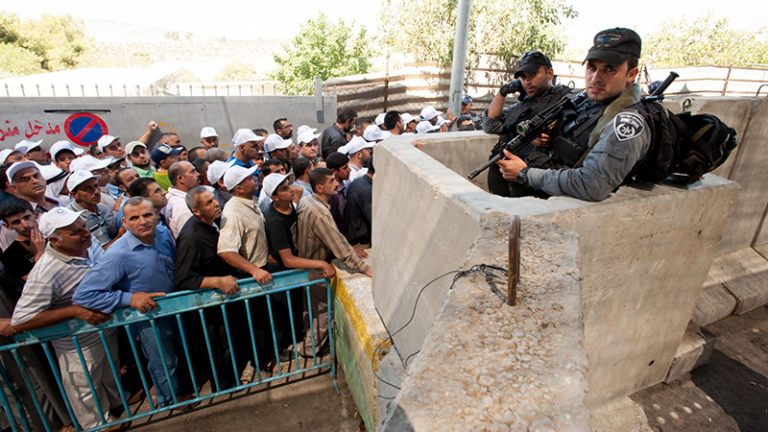
In the last few weeks, there has seen an uptick in armed attacks by Palestinians within the green line. From the Palestinian perspective, these attacks deliver key messages: Israelis are not insulated from the impact of those they subjugate; attacks can and will happen, even behind the separation wall; and, while Palestinian politicians have condemned the attacks, a not insignificant number of Palestinian citizens of Israel are clearly committed to armed resistance. This renewed sense of unified struggle comes because of the events of 2021, called the Unity Intifada, in which Palestinians across a number of communities engaged in protest and rallied around those at risk in Jerusalem and under bombardment in Gaza. From the Israeli side, these attacks have confirmed the need for segregation, increased repression, and reinvigorated discussions of Palestinian cultural pathology.
But key questions arise: who chooses to engage in these attacks, and why do people engage in armed tactics over nonviolent ones? What explains today’s uptick?
The trajectory of Diaa Hamarsheh, the 27-year-old man who executed the attack in Bnei Brak, sheds some light on these questions. Diaa came from the village of Yaabad outside Jenin in the occupied West Bank, and had previously served a prison sentence following a conviction from the notoriously racist Israeli justice system. He was politically active as a member of Fatah. A few days before the attack, a family member of Diaa’s, and her infant, were the victims of a settler attack in the West Bank and narrowly escaped with their lives. Each of these facts allude to key dynamics that help us understand the increase of armed tactics more generally.
First, it is important to note that Diaa’s trajectory demonstrates how Israeli policies have made life increasingly unbearable—especially in those villages and towns outside of Area A (designated in the Oslo Accords as under full Palestinian control), but also for Palestinians under Israeli rule more broadly. Settler attacks, always aided by uniformed Israeli forces, are on the rise, reaching unprecedented levels. Restrictions on travel, work, and freedoms of association and expression are ever increasing. Moreover, the internal Palestinian political situation remains stagnant, with no hope of representative government through the institutions of the Palestinian Authority, and no alternative institutions or political projects that can advocate for self-determination on the international stage.
Diaa’s choice to launch an armed attack, knowing full well that he would also die in the process, is thus not an act of madness or a symptom of a culture of violence. As my research shows, not only is armed resistance the most popular option according to public opinion polling, but those who are most in support of such a strategy are also those who are the best informed. They have the strongest social ties and are well networked in political power structures. Such respondents are often politically active, and highly educated. Diaa fits this trend, as an active member of a political movement and an individual with previous engagement with the Israeli authorities.
In the occupied Palestinian territories, society is polarized, social cohesion has eroded, and mass mobilization is more difficult to achieve. In this context, those who have the strongest social ties, like Diaa, use them to gain information and gauge risk. They are plugged into their communities as well as broader networks. As a result, they look around and recognize that sporadic mass mobilization no longer has the impact it once did, even if Palestinians are able to coordinate at all. They engage with society and find divisive politics and infighting within political movements. Their social ties thus help them to recognize the weakness of social cohesion in society at large and, based on this perception, decide that armed strategies are the most effective option. Support for armed tactics, particularly among this subset of the population, suggests that violence in the Palestinian territories is not a spontaneous eruption, but rather a strategic choice that individuals endorse based on a reasoned assessment of available options and constraints.
Finally, the timing of these attacks cannot be ignored. It is true that the events of the Unity Intifada last year electrified the imagination of Palestinians across geographic lines and political divisions. Many segments of Palestinian society displayed a great deal of enthusiasm, and actively participated in not only protests but other political actions, such as the solidarity trips between Palestinian communities and the joint economic strikes. But since then, activists have struggled to seize and channel that momentum effectively, even as political and living conditions for Palestinians continue to deteriorate. To a sizeable group of Palestinians, armed strategies seem to be the only proactive course of action with an immediate discernible effect.
Most importantly, these attacks came at the same time as the Negev Summit, a meeting of US Secretary of State Antony Blinken with Israeli and Arab officials from normalizing states, without any Palestinian involvement. Such attacks are then not arbitrary, but a direct sign of dissatisfaction and frustration. They send the message that the ongoing conflict with Palestinians cannot be overshadowed by illiberal peace agreements and authoritarian conflict management. Instead, Israel will continue to confront threats to its security from within until Palestinian demands are met.
In response to the recent attacks, Israeli police have cracked down on Palestinian communities within the green line, launched raids on Jenin and surrounding areas—killing a number of Palestinians—and began restricting Palestinian laborers from accessing their work sites beyond the separation wall. But no Israeli official has proposed addressing the underlying causes of continued attacks; primarily, the political conditions under which Palestinians live and which offer them no alternatives. To be sure, Nelson Mandela once argued, “When a man is denied the right to live the life he believes in, he has no choice but to become an outlaw.” There thus should be no surprise when such attacks continue in the foreseeable future.

